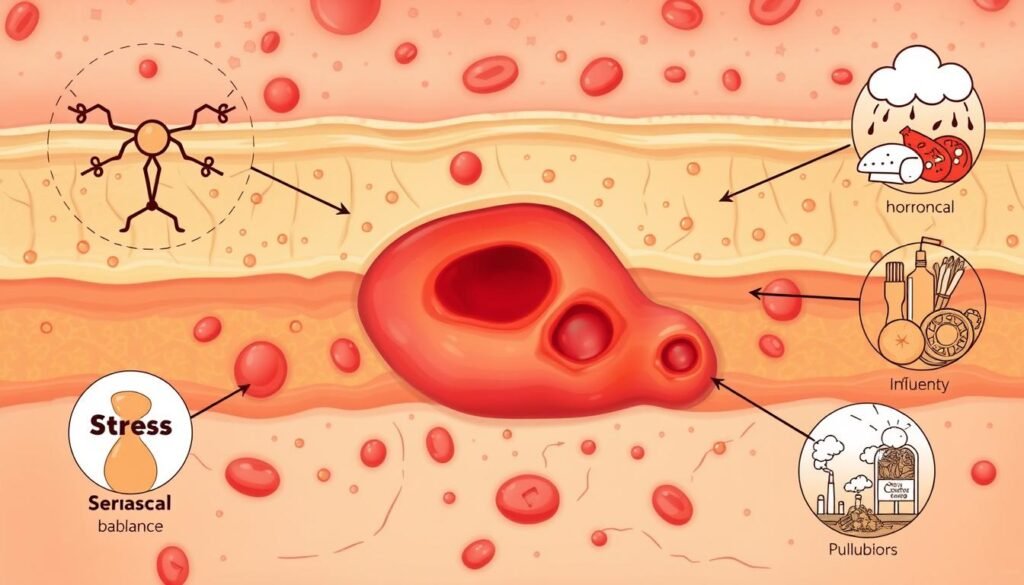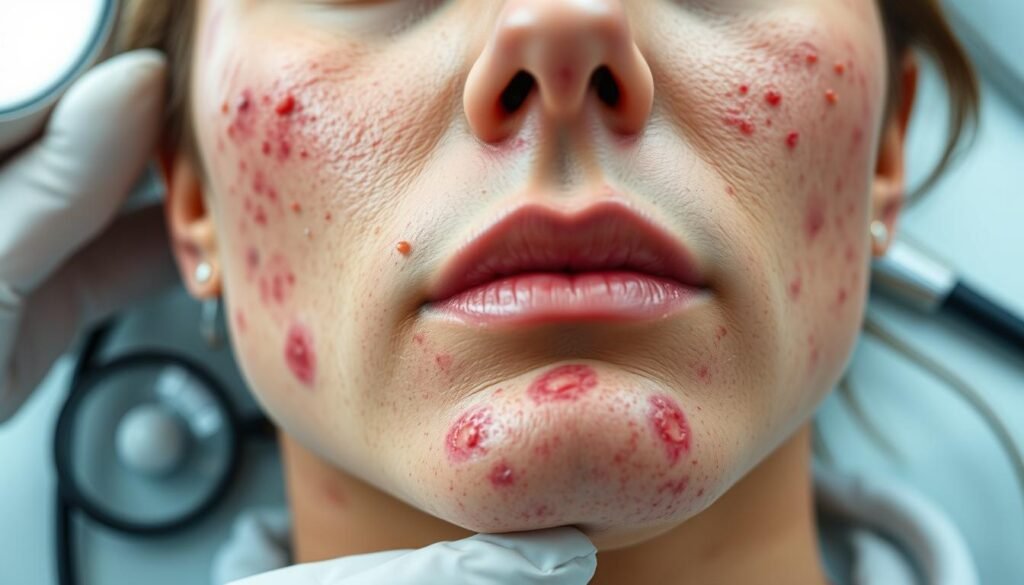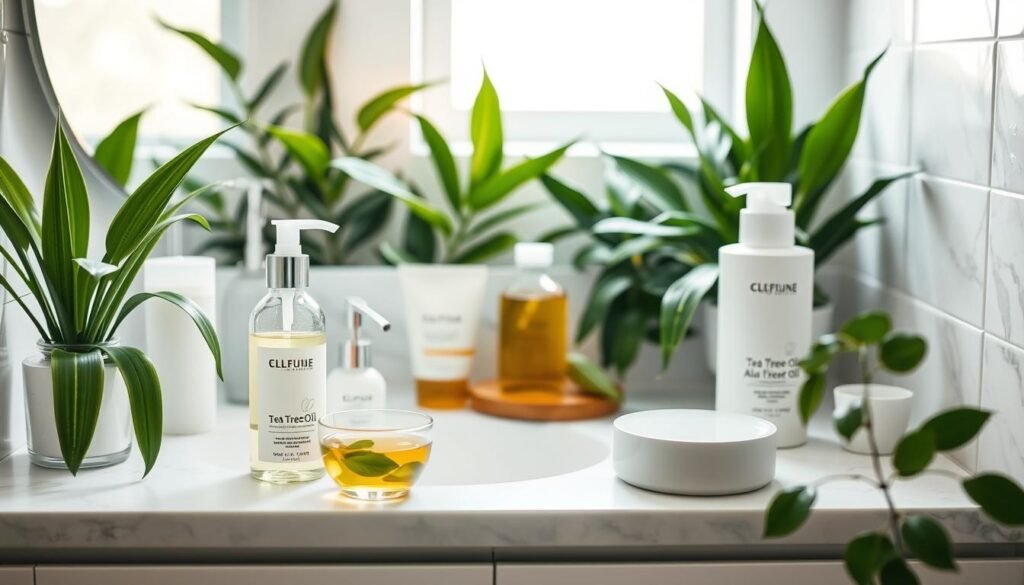Over 50 million people in the United States struggle with acne yearly. Of these, some deal with cystic acne, the most severe kind. It’s painful, with inflamed spots deep under the skin, and can leave scars. But by understanding what causes it—like hormones, what we eat, and our genes—we can fight it better. This guide will show you how to manage and treat cystic acne with smart choices and treatments.
Key Takeaways
- More than 50 million individuals in the U.S. suffer from acne annually, highlighting its prevalence.
- Cystic acne, characterized by painful lesions, is the most severe type of acne.
- Hormonal imbalances and genetic factors can significantly affect acne development.
- Effective treatment options range from over-the-counter remedies to prescription medications.
- Good skincare habits play a crucial role in preventing cystic acne breakouts.
- Stress management techniques can also help reduce the severity of acne flare-ups.
Understanding Cystic Acne
Cystic acne is the toughest type of Acne Vulgaris. It features deep, painful cysts under the skin. People with oily skin are more at risk, leading to scars if not treated right. It’s deeper than other acne types and can harm the skin for a long time.
Teenagers, women, and adults with hormone changes often get it. Stress can make it worse. To fix it, you might need a skin doctor. They can give special meds like isotretinoin, helping 85% of folks in a few months. Creams like Retin-A work better than what you find in stores.
Knowing how cystic acne scars is key. Don’t pick at cysts. Start a good skin care plan early. Eating less sugary and starchy foods helps too. You’ll likely need a plan just for you with diet tips and meds.
What Causes Cystic Acne?
Cystic acne forms due to many factors. Knowing these can help people find the right treatments. Things like hormone changes, genes, and what you eat all matter. Each plays a part in starting cystic acne.
Hormonal Factors
When hormone levels change, more oil can form on your skin. This oil can clog pores and lead to outbreaks of cystic acne. It’s more common at times like puberty, during periods, and in pregnancy. Using different hormone therapies can add to the problem. This makes it important to get advice from a doctor.
Genetic Predisposition
If your family has a history of severe acne, you might be more likely to get it too. This shows genetics play a big role. Researchers have found certain genes more often in those with cystic acne. This points to the need for treatments that are more personalized.
Dietary Influences
Your diet can affect how bad your acne gets. Eating a lot of sugar and carbs can make inflammation and acne worse. Though many think certain foods cause acne, it’s mainly foods with high glycemic levels that are a problem. Changing what you eat can help manage acne. To learn more, check out this resource.

Symptoms of Cystic Acne
Cystic acne brings up many tough symptoms. The most obvious are the painful acne lesions. Knowing these symptoms helps us see how cystic acne affects someone’s life.
Painful Acne Lesions
Painful acne lesions stand out in cystic acne. These hard, swollen bumps hurt and can itch a lot. They’re often filled with pus and can break open. This can cause more swelling and scars. People with these lesions feel very sensitive. This can mess with their day-to-day life and make them avoid being close to others.
Physical and Emotional Impact
The physical signs of cystic acne do a number on your feelings too. A lot of young people feel ashamed, worried, and sad about their skin. These feelings can make someone’s self-esteem drop and hurt their social life. It shows why treating both the physical and emotional parts is key. Finding good treatments for both is essential for dealing with cystic acne.
Diagnosing Cystic Acne
A dermatologist must examine the skin closely to diagnose cystic acne. They look at the skin and consider your medical history. It’s important to tell this acne apart from other kinds, like nodular or inflammatory acne. The right diagnosis is key because it shapes the Acne Treatment Plan.
Dermatologists mainly use visual exams, but sometimes they need imaging tests for tricky cases. They know cystic acne often shows up in people with oily skin. It usually affects teenagers and adults going through hormonal changes. Women get it more often than men, typically on the lower face.
The doctor might ask about what you eat and how stressed you are. Foods high in sugar can cause acne. Stress can make it worse. These factors are explored to understand the acne better.
The treatment can include different effective methods, like oral antibiotics or retinoids. It’s vital to have an Acne Treatment Plan meant just for you. This helps get great results and avoid scarring from cystic acne.

| Diagnostic Factor | Description |
|---|---|
| Skin Assessment | Visual examination of acne lesions by the dermatologist. |
| Medical History | Discussion about previous skin issues and family history of acne. |
| Hormonal Considerations | Assessment of hormonal imbalances that may trigger cystic acne. |
| Lifestyle Inquiry | Questions about diet and stress that might contribute to acne. |
| Potential Imaging | Use of imaging tests if unusual cases are suspected. |
Treatment Options for Cystic Acne
Cystic acne is a tough skin condition with painful bumps under the skin. It needs a detailed treatment plan. Over-the-counter options work for mild acne but tougher cases might need stronger treatments.
Over-the-Counter Treatments
Mild cystic acne can be eased with Over-the-Counter Treatments. Benzoyl peroxide is great for killing bacteria and opening pores. Other products like salicylic acid also help but might not be enough for serious acne. Using these too much might irritate your skin. It’s wise to get advice from dermatologists for what’s best for you. This guidance is key for the right treatment
Prescription Medications
When basic products don’t cut it, prescription meds are the next step. Isotretinoin, or Accutane, is really effective for harsh acne. Studies show that 85% see big improvements after taking it. But, it has side effects that need watching. Antibiotics like doxycycline work by reducing inflammation and bacteria. For breakouts linked to hormones, like in Polycystic Ovary Syndrome, spironolactone is helpful, especially for women.
In-Office Procedures
If you need fast relief, doctors might suggest in-office procedures. For instance, putting corticosteroid injections into the cysts lessens swelling quickly. Draining big cysts must be done by experts. Plus, treatments like microneedling help reduce scarring left by acne. Visiting a dermatologist regularly helps keep your treatment on the right track as you heal.
| Treatment Option | Type | Effectiveness | Notes |
|---|---|---|---|
| Benzoyl Peroxide | Topical | Moderate | Good for bacteria reduction and unclogging pores. |
| Isotretinoin (Accutane) | Oral | High | 85% find permanent clearing; needs monitoring. |
| Doxycycline | Oral | High | Effective antibiotic for inflammation. |
| Corticosteroid Injections | In-office | Immediate | Reduces inflammation swiftly. |
| Microneedling | In-office | High | Helps with post-acne scarring. |
To manage cystic acne well, you might need both over-the-counter and prescription treatments. Professional help is often needed. Seeing a dermatologist regularly can make your treatment work better and keep your skin healthy.
Preventing Cystic Acne
To prevent Cystic Acne, it’s key to focus on skin health. This means sticking to good Skincare Practices and making positive Lifestyle Changes. Doing so helps avoid breakouts and keeps existing ones under control. A daily routine can really improve how your skin looks and feels.
Skincare Practices
It’s crucial to wash your face twice a day to prevent cystic acne. Use gentle cleansers, like Cetaphil, to keep pores clean and irritation-free. Adding acid-based products into your routine can prevent clogs. Choosing makeup that won’t clog pores and removing it at night is also key.
Using soothing moisturizers or hyaluronic acid helps the skin’s barrier. This avoids drying from acne treatments.
Lifestyle Modifications
Making healthy Lifestyle Changes is also key to stopping Cystic Acne. Eating a diet low in sugar can make a big difference for your skin. Using mindfulness and exercising can reduce stress, which benefits your skin. Making sure you drink enough water and get plenty of sleep helps too.
| Skincare Practices | Description |
|---|---|
| Gentle Cleansing | Use suitable cleansers to wash the face twice daily, minimizing irritation. |
| Non-comedogenic Makeup | Opt for makeup labeled as “oil-free” to prevent pore clogging. |
| Proper Moisturization | Apply calming creams or hyaluronic acid-based products to reduce dryness. |

Cystic Acne vs. Other Forms of Acne
Cystic acne is a severe type that needs careful understanding for treatment. Knowing the difference between cystic, nodular, and inflammatory acne is key. This knowledge helps with finding the right treatment path.
Understanding Severe Acne
Severe acne includes cystic acne, which shows up as large, pus-filled boils. It often requires care from skin doctors. Unlike mild acne, which might have less than 20 spots, cystic acne can hurt and scar.
Comparing Nodular and Inflammatory Acne
Nodular acne has hard, inflamed bumps that usually need a doctor’s care. Inflammatory acne ranges from small bumps to big, painful cysts. Cystic acne’s lesions are deeper and hurt more than other types. For each acne type, there are specific treatments. Proper diagnosis and management are crucial. For more details, visit this resource.
The Role of Stress in Cystic Acne
Stress can significantly worsen cystic acne. A study found a clear link between stress and acne severity. It showed that high stress levels can make acne flare-ups more common. This shows how stress and acne can feed into each other, making a tough cycle to break.
When we’re stressed, our body makes more cortisol. This hormone boosts oil production, which can block pores. That leads to cystic acne. Chronic stress also kicks off the hypothalamic-pituitary-adrenal (HPA) axis, causing even more oil production in the skin. These hormonal changes are big triggers for cystic acne in both women and men.
Research has found that 82% of patients see stress as a trigger for their acne. This highlights how vital it is to treat stress when dealing with acne. Stress can also weaken the skin’s natural barrier and slow down healing. This might make cystic acne lesions stay longer.
To lessen these bad effects, effective stress management is key. Taking care of yourself through exercise, better sleep, and relaxation can help. These self-care steps are good for your mind and skin health.
Knowing how stress affects acne helps us understand this complex issue better. It’s important to look at psychological factors as well as usual acne treatments. This broader approach can help manage cystic acne more effectively.
Long-term Management Strategies
Managing cystic acne means following a full plan to keep your skin healthy. It also helps avoid the stress acne causes. A good plan includes medical care, lifestyle changes, and regular doctor visits.
To manage acne well, patients should use these tips:
- Ongoing Dermatological Care: Seeing a dermatologist often lets them track your progress. They can change the treatment if needed. This is important to check for medicine side effects and see if treatments work.
- Personalized Treatment Plans: Everyone’s skin is different. Treatments can include creams, oral antibiotics, and sometimes isotretinoin for tough cases. The key is finding what works for your specific skin.
- Holistic Self-Care Practices: Using gentle skin care and special products can boost results. Making healthy life choices helps too. This includes managing stress and eating well for better skin health.
It’s crucial to also think about how cystic acne affects your emotions. Working on your self-esteem and ways to handle stress is key. Finding support through groups or therapy helps you feel less alone.
Making changes in your daily life helps your skin too. This includes sleeping well, exercising, and eating foods full of vitamins. All these steps are part of a big plan for healthier skin and a happier you.
Conclusion
Cystic acne needs a deep understanding of what causes it and how to treat it. If not addressed, it can affect someone’s life for a long time. It’s important to know it might come from hormone changes, genes, and too much oil in the skin. Getting help early is key.
There are many ways to treat acne, from simple creams to strong medicines. Drugs like doxycycline and isotretinoin can clear up the skin in months. It’s crucial to talk with a doctor to make a plan that’s right for you. This plan should include taking care of your skin and living a healthy lifestyle.
To get better skin, one must understand their acne and look into different treatments. Keeping up with new treatments and staying active in care can help beat acne. This way, a person can feel good about their skin again.